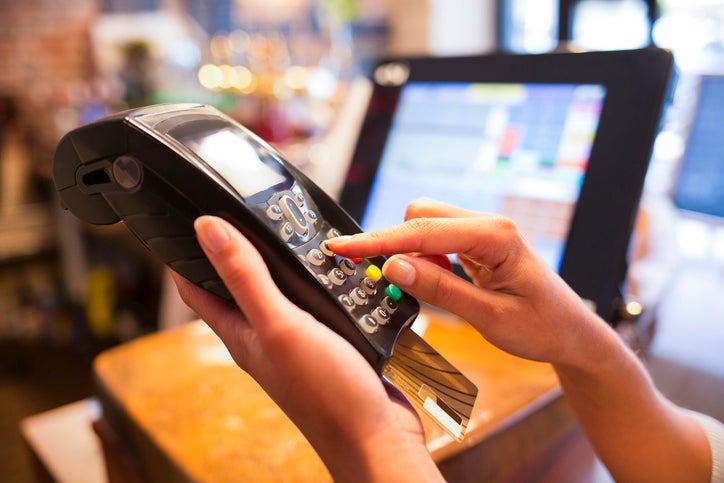How to easily protect your small business against card fraud
If your business takes card payments for goods or services, you need to be clued-up to the dangers of card fraud. Even if most of your sales are done face-to-face, you could still be targeted by fraudsters.
Luckily, Bionic has written a handy guide to help safeguard your business against card fraud, read on for some top tips.
What is card fraud?
Credit card fraud is a serious type of identity theft. It involves stealing someone else’s credit or debit card details. The scammer can then use the details to make purchases or remove money from the owner’s account, most of the time without them even knowing until it’s too late.
Card fraud is rife in 2022 and unfortunately, scammers have come up with smarter ways to access personal information — they don’t even need to steal your physical card anymore.
If you’re looking into accepting card payments as a small business, check out our guide.

What are the different types of card fraud?
There are lots of different types of card fraud and anyone with a credit or debit card can be affected. Scammers can steal information online, over the phone, via email or text. They can even clone your card using high-tech technology inserted into ATM machines or by stealing your actual card.
You can also have your information stolen if a company suffers a data breach and customer information gets leaked. The main types of card fraud you need to be vigilant about are ‘card-not-present’ and ‘card-present’ fraud.
Card-not-present fraud
Card-not-present fraud is when the card is not physically present during the transaction.
These types of scammers mostly get your details through phone calls, texts or emails claiming to be someone else. For example, over the last couple of years, there has been an influx of people getting emails or texts from entities claiming to be Royal Mail or HMRC, prompting users to input their card details in order to pay for a parcel that can’t be delivered or stating you’re due a refund from HMRC.
This fraud can often occur online as it’s easier to steal information via the internet, this makes card-not-present fraud one of the hardest to detect and report.
Card present fraud
Card-present fraud on the other hand is fraud where the scammer physically presents the stolen or cloned credit card in a shop, business or service provider. The scammer may have stolen the card from you or created a cloned card with your details.
This type of fraud is equally as violating but can sometimes be easier to pick up and track. For example, if your card is suddenly being used in a different city or country when you know you haven’t left your area or visited these places, it can be easier to spot and report.
What are the consequences card fraud can have on my business?
There are many reasons you want to prevent card fraud. It can negatively affect your business if funds get stolen, it could also compromise the safety of your own customers. Some main consequences of card fraud are:
Stolen funds
One of the biggest consequences of card fraud is money being stolen from your account. Losing money can financially damage your business and cause sales to suffer as a result.
Other vital parts of your business can be affected by stolen funds too. For example, you might not be able to pay your staff’s salaries or keep up rent on office space.
Damage reputation and relationships
If your company is fighting to stay afloat because funds have been stolen, you might not be able to offer the same quality of service you usually do. As a result, you might be unable to keep up valuable relationships you’ve spent time forging with clients, suppliers and other businesses and your reputation could be damaged.
How to detect a fraudulent card
Although anyone with a card can be affected by card fraud, there are some ways you can potentially detect it as a business owner.
It’s all about being vigilant and careful, make sure you report anything suspicious to the police and if you suspect someone has your card details, contact your bank as soon as possible to let them know you need a new card and to potentially freeze your account.
Some red flags to look for when taking customer payments include:
- An IP address that doesn’t match the card address you have for the customer on file
- Lots of declined transactions in a row
- An odd or spammy-sounding customer email addresses
- A clear difference between shipping and billing addresses
- If a customer attempts to enter the card number incorrectly multiple times
- If a customer seems to be acting suspicious e.g …being flustered or seems unsure or on edge when inputting card details
What to do if you suspect fraud
If you think your card details have been compromised and your business is under threat, there are a few things to do.
- Contact the customer — First of all, you need to reach out to your customers and let them know there has been a breach and your company may have been involved in a scam. You must do this as quickly as possible as you don’t want the scammer to reach out to your customers posing as you and encourage them to enter their own card details.
- Reach out to the payment processor — Next, contact your bank and payment processer to let them know of your concerns. They will be able to advise you on the next steps, check if any unauthorised payments have gone out and cancel your card if necessary.
- Delay shipments — Once you’ve informed your bank and contacted all customers, , contact your supplier and have them delay any shipments you have previously arranged. You don’t want the scammer to have access to your suppliers and impersonate your business to steal more money.
How to protect your business from fraud
Although any business can be affected by fraud, there are a few things you can do to safeguard your company and make it harder for scammers to target you.
- Carry out regular financial audits — Make sure you’re paying attention to what money is going in and out of your accounts. Audit paperwork regularly so you’re on the ball and will be able to notice if something isn’t quite adding up.
- Make sure your staff are properly trained — Make sure all your staff are properly trained in fraud prevention so they can recognise potential signs and flag them to you as the business owner.
- Set up a clear process — Make sure you and your staff are on the same page and they know what to do if they think they have uncovered some form of fraud. It might be a good idea to set up an email address or phone line for staff to make reports about red flags they’ve noticed. Then you can go through and assess them, comparing them against your books to see if they need further attention.
- Keep an eye out for red flags yourself — Fraud can affect any business. Be vigilant, look out for odd transactions on your account, spammy-sounding emails and others acting suspiciously.
Who is at fault when a fraudulent card is used?
You must contact your card provider as soon as possible if you suspect someone else has your card details or has access to your accounts. Your payment provider can then cancel your card and might be able to recover an amount of the money that’s been stolen
You are not at fault if someone clones your card and uses it, but you may have to submit evidence to the bank and police to prove you are not involved in the situation and claim your money back.
How can Bionic help your business?
Protecting your business against card fraud is a big job. Although Bionic can’t offer a fail-safe way to keep safe against scammers, we can take the stress out of business admin, freeing up time for you to focus on keeping your business secure.
Luckily, that’s where Bionic can help you save time, hassle, and unnecessary admin when sorting business essentials. We compare business gas and business electricity, as well as business phone and broadband to help make sure you're on the best deals.
We can also help with business insurance and business finance. Get in touch to find out more.








